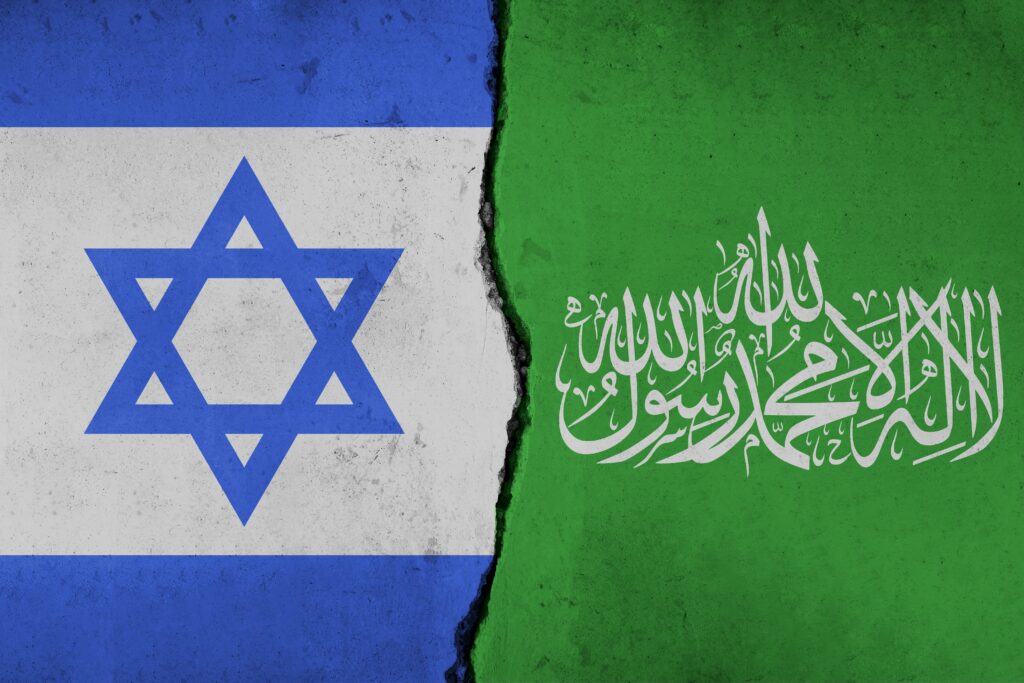IN THE MEDIA
A peace deal of hopes and fears
October 11, 2025 | Justin Amler

Sky News Australia – 11 October 2025
There is a new sense of optimism sweeping much of the world after Hamas finally agreed to President Trump’s peace plan proposal on Thursday morning. After two years of excruciating agony for Israel and for the families of hostages held in Hamas’ terror dungeons, the hope — however cautious — is that they are finally coming home.
For those who’ve watched the hostage videos, who’ve seen the faces of emaciated men, women, and children paraded before cameras and caged underground like trophies of war, the very idea of their release feels like a miracle.
President Trump has declared the acceptance of the deal as the first step toward “everlasting peace.” But the reality is somewhat different. Because negotiating with Hamas is not like negotiating trade tariffs in Brussels. It’s negotiating with a death cult — an organisation that sanctifies murder, celebrates martyrdom, and uses human beings as shields, bargaining chips, and necessary sacrifices for its cause.
Hamas has agreed to deals before — and broken every one. This is the same group that ‘accidentally’ returned a Palestinian body to Israel, pretending it was Israeli mother Shira Bibas who was taken hostage on October 7 with her two young boys and subsequently murdered. The same group whose charter still calls for the destruction of Israel. To imagine that such an entity will suddenly surrender its power, hand over its weapons, or renounce its mission is to misunderstand who — and what — Hamas is.
And yet, there is something different this time.
For the first time, the full weight of the Oval Office is behind a deal. And also for the first time, many Muslim and Arab nations, including countries with long-standing ties to Hamas such as Qatar and Turkey, have welcomed and supported the agreement. That’s no small thing. By attaching their names, they’ve attached their reputations. It will be harder for Hamas to wriggle free while its own allies are watching.
But let’s be clear: the only reason Hamas agreed to this deal is because it had no choice. It is not peace-loving; it is exhausted. It was forced to the table by the relentless pressure of Israeli military might, coupled with a strong American president in Donald Trump. Without that pressure — without the IDF’s determination to dismantle Hamas’ terror infrastructure — there would be no “peace deal,” no “negotiation,” no “hope.” Just more tunnels, more rockets, more dead Israelis and Gazans alike.
The agreement, we’re told, will unfold in three phases. The first, involving the release of all Israeli hostages — both the living and the dead — in exchange for Palestinian terrorists in Israeli jails and a partial Israeli withdrawal, is, in a way, the simplest. This is the phase Hamas has accepted. But there is no agreement yet on the second and third phases, which include the demilitarisation of Gaza and the exclusion of Hamas from any future governance. These will test whether this is truly the beginning of lasting peace, or merely another pause before the next round. Hamas, like all death cults, will not willingly give up power.
Israelis understand this deeply. This is not the same Israel as on October 6, 2023 when there was a ceasefire in place, which Hamas broke. The days of placating Hamas through financial incentives and diplomacy are over.
Australian Prime Minister Anthony Albanese tried to claim a share of the credit, issuing a statement welcoming the deal and insisting that Australia had been part of international calls for a ceasefire and the return of hostages. But this is unrealistic, because, along with leaders in France and elsewhere, their virtue-signalling recognition of a non-existent Palestinian state was entirely counterproductive. Hamas even praised them, saying it was a result of the “fruits” of the October 7 attacks. By remaining fixated on a “two-state solution” rather than the only real priority — removing Hamas from power, they did nothing to help bring about the end of the war, but only delayed it further by giving Hamas false hope.
But it’s not just Hamas that is the problem. There is a radicalised, indoctrinated society that, if not reformed, will only lead to another October 7. A radicalism nurtured for generations by UNRWA, which has educated Gazans using antisemitic textbooks that deny Israel’s right to exist. These are the same materials used by the Palestinian Authority — the so-called “moderate” counterpart.
Then there are the anti-Israel demonstrations that have plagued our major cities for the last two years, accusing Israel of genocide and demanding a ceasefire. They have finally been granted the ceasefire they demanded — so does this mean they’ll stop protesting? Because if not, it will prove, as many of us have argued, that it was never about peace, but about Israel’s very existence. Many are not celebrating the ceasefire today — they are mourning it.
Despite these concerns, what’s most important to remember is that Israel is a nation that values the lives of its people above all else – willing to make difficult and painful decisions, including releasing hundreds and thousands of convicted terrorists for the return of their precious loved ones. We can only hope and pray that in the coming days those loved ones will indeed be free. Because until they are back on Israeli soil, they remain in the clutches of an evil entity.
Justin Amler is a policy analyst at the Australia/Israel & Jewish Affairs Council (AIJAC).
Tags: Gaza, Hamas, Israel, Palestinians





